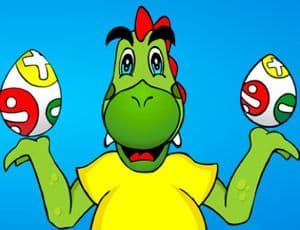Escola Games | Jogos Educativos
https://www.escolagames.com.br
Teacher's support sheet

Dino Multiplication Table
Dino wants to play in the magical world and you need to help with multiplication. Choose a multiplication table and answer the questions to start the adventure!

Teacher's tips
Level of Education: Elementary School
Subject: Mathematics
Theme: Numbers and operations
Age: 7 to 11 years old
Many children struggle to learn multiplication tables. As a teacher, you must provide students with an effective learning process. Knowing how to multiplicate quickly is an ability that kids will need in many daily situations. You will need time, strategy, patience, and dedication so that students start liking the content. Because of that, the DINO'S MULTIPLICATION TABLE will help you work with this content playfully and efficiently. The game has two levels of difficulty with the four operations. These difficulty levels are necessary to follow their development. [FIM-DICA]
Learner outcomes
To memorize the multiplication tables;
To practice mental calculation;
To allow students to interact, collaborate, and share experiences;
To solve math problems involving the four operations;
To analyze similarities between multiplication, division, subtraction, and addition;
To improve logical thinking by establishing comparisons between the operations;
To be able to realize that division is 'the opposite of multiplication;
To relate multiplication and addition;
To reinforce the content discussed during classes.
Teachers' goals
To offer situations in which students get to analyze, interpret, and see the possibilities of the four basic operations;
To create strategies for mental calculation;
To stimulate students to like mathematics with the game;
To offer the game as a didactic resource to explore the content discussed in the classroom;
To enable students to socialize and share their knowledge;
To encourage students to study the multiplication table and use it;
To work with daily matters to stimulate students to find answers using maths;
To help students to understand the content through games;
To propose playful activities.
Suggestions of approaches for the teacher
(Approach 1) Students can play this game individually or in groups. The teacher should decide that based on their goals.
It is essential to check the strengths and weaknesses of students so that you can divide them into productive groups. Students with different abilities can work together to widen their knowledge individually and develop together.
An important aspect is the regularity of each topic. The teacher's intervention must contribute so students can understand the mathematics notation system and how the decimal system works.
(Approach 2) MATHS BINGO: Put on the operations board the place students should insert the result they find. The first one that marks it correctly wins.
(Approach 3) POP BALOONS: Put inside some balloons operations and ask students to pop them and solve the problem.
(Approach 4) MULTIPLICATION TABLE SHUFFLE:
Put some circles with different numbers on a table with the numbers facing down.
The players have to choose two circles and multiply the numbers.
In case they get it right, they keep the circles. If they get the wrong answer, place the circles on the table and scramble them.
The game continues like this and only ends when all the circles are with the students. The kid with more circles wins.
(Approach 5) ROLLING DICE: Take two dice to the classroom. Roll the dice and write an operation with the numbers that you get. You can start the game by doing addition operations. Then, you move on to other math operations. Students can write the answers on their notebooks to check later.
(Approach 6) TIC-TAC-TABLE: Each player has to choose two numbers on the same line and multiply them. If the result is correct, they can mark their symbol. Players take turns. The student that gets four numbers on the horizontal, vertical, or diagonal wins.
(Approach 7) FLASH CARDS: Cut sheets of paper into smaller pieces. On a side, write the operation --> 4x9, for example. On the other side, write the answer to that, 36, on that case. You can mark the time students take to solve a specific number of operations. Then, keep marking it on other days so that they can see their improvement. Encourage them to improve.
(Approach 8) Organize a day to decorate the classroom using maths symbols and references.
More about the content
5 Tips for Improving Students' Success in Math
WHAT THE TEACHERS RECOMMEND
Build confidence. More than two-thirds of respondents (68 percent) cited lack of confidence as a problem that prevents their students from succeeding in mathematics.
Encourage questioning and make space for curiosity. Sixty-six percent of respondents said their best piece of advice for students looking to do well in math was to not only pay attention in class but also ask for clarification when they need to better understand something.
Emphasize conceptual understanding over procedure. Three out of four respondents (75 percent) emphasized that working hard to understand math concepts and when to apply them versus simply memorizing formulas is essential to doing well.
Provide authentic problems that increase students' drive to engage with math. Sixty-three percent of participants pointed to students' desire, initiative, and motivation to succeed in math as being critical, and the majority of them (80 percent) said that applying math to real-world problems helps increase both student interest and understanding.
Share positive attitudes about math. Teachers suggest that parents avoid talking negatively about math, and especially avoid saying that it is hard or useless (74 percent)—instead they should encourage their kids not to give up, and help them find math mentors when they're not able to answer questions (71 percent).
Source: https://www.edutopia.org/article/5-tips-improving-students-success-math/
Here are some other games that can help students learn the four basic operations:
Logical Robot
https://www.bestschoolgames.com/games/logicalRobot/
Numbers Battle
https://www.bestschoolgames.com/games/numbersBattle/
Bubbles Catcher
https://www.bestschoolgames.com/games/bubblesCatcher/
Math Master
